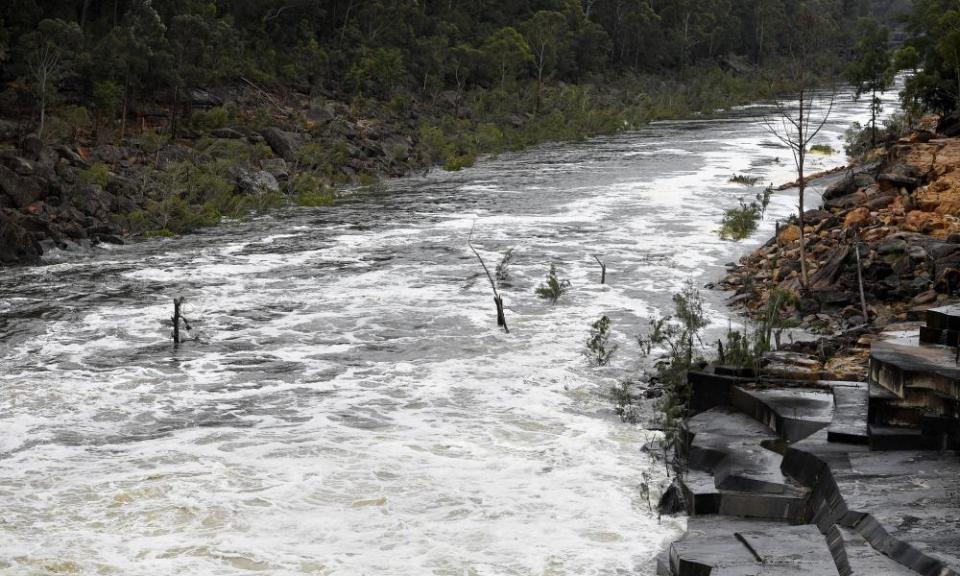NSW floods and wet weather: towns along Hunter River ordered to evacuate

An evacuation order has been issued for towns along the Hunter River in New South Wales after emergency services rescued 12 people overnight, and 120 since the wild weather began.
Heavy rain has lashed most of NSW for nearly a week, causing flooding and threatening power and water services.
State Emergency Services had already rescued 30 people since Friday, among more than 745 requests for help, with SES commissioner Carlene York telling reporters the weather event is expected to continue.
“The weather event that we’re experiencing at the moment is quite a significant event across the whole of New South Wales,” she said.
Related: NSW floods: Sydney’s Warragamba Dam spills as warnings issued in Upper Hunter
“It is expected that the rain will continue it might ease at the beginning of the week but there’s another front coming closely behind that. So, at the moment, the circumstances are that all our dams are full and some are on alert, and are going up to capacity.”
York also urged residents to follow the orders issued by emergency services, after some of the rescues overnight came from people driving through flood waters.
“Some of those flood rescues over the whole event have been people driving into flood waters. It is dangerous, you can’t assess the depth of the water.
“We’ve also had a number of people that have driven out and become isolated between flood waters where we’ve had to go and get those people.”
The evacuation order covers about 2,000 people in Whittingham, Scotts Flat, Glenridding, Dunolly and Combo, after the Hunter River rose to 12.71 metres at Singleton causing moderate flooding.
The SES said it was pushing people to get to safer areas, with fears that the waters will cut off road access.
“Once flood water begins inundating the area road access water, sewerage, power, phones and internet may be lost,” the SES said in the evacuation order. “If you remain in the area you will be trapped and it may be too dangerous for SES to rescue you.”
Flood Update: #Singleton currently just 0.3m below the Major Flood level of 13m. Conditions should start to ease today. An Evacuation Order is still in place. Keep an eye on river & road conditions and follow instruction from Emergency Services @NSWSES https://t.co/LQtkA4SOSk pic.twitter.com/gq2zQPOHNO
— Bureau of Meteorology, New South Wales (@BOM_NSW) November 27, 2021
The Bureau of Meteorology forecasts that the Hunter will also rise at Maitland to about 8.40 metres on Monday.
Major flood warnings were issued for the Lachlan River at Jemalong and the Namoi at Narrabri and Wee Waa for Saturday evening, with fears the flooding could cut residents off for more than a week.
The bureau is also watching Coonamble, where major flooding is possible along the Castlereagh River, which has “risen significantly” on Sunday morning. It is expected to exceed moderate flood levels around midday Sunday, and could reach major flood level by evening.
Major flooding is also likely at Warren on Monday, with the Macquarie River expected exceed moderate flood levels and peak at nearly 9 metres by Tuesday.
The Bureau said some of these regions were hit with more than 100mm of rain on Friday.
Sydney’s Warragamba Dam began spilling shortly after 9pm on Friday.
WaterNSW said the outflow volume could peak at a rate of about 60-80 gigalitres a day, just a fraction of levels in March that peaked at 500 gigalitres a day.
“On current projections the spill could continue for up to a week,” WaterNSW saidon Saturday, adding that “downstream impacts are likely”.

 Yahoo Finance
Yahoo Finance 